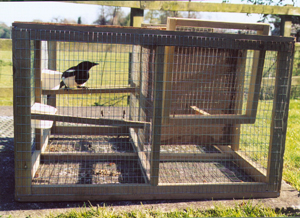 Land managers in Scotland have agreed on a year-long study, instigated by the UK’s largest shooting organisation, the British Association for Shooting and Conservation (BASC), to analyse the extent of unauthorised interference with legal traps and snares.
Land managers in Scotland have agreed on a year-long study, instigated by the UK’s largest shooting organisation, the British Association for Shooting and Conservation (BASC), to analyse the extent of unauthorised interference with legal traps and snares.
The study will use trap and snare interference reports collected from BASC members and members of other land management organisations to supply a monthly analysis to the Scottish Government and to the Partnership for Action against Wildlife Crime (PAW Scotland).
The use of traps and snares to assist with the management of certain pest species of bird and mammal, such as crows, rats and foxes, is tightly controlled by legislation in Scotland. Depending on the tool used, operators now have to be trained and traps and snares tagged so that the user can be identified.
Despite this level of control there are a number of reports of legal traps and snares being tampered with, moved and vandalised. Such actions are illegal and not only reduce the efficiency of pest control but can also compromise animal welfare, especially if traps or snares are moved and cannot be checked at regular intervals.
At a recent meeting of the Rural Affairs, Climate Change and Environment Committee the Minister, Paul Wheelhouse MSP said: “We do not have statistical evidence of the issue; we have only anecdotal evidence and suggestions from people that that might happen. Hopefully, the work that BASC will do, with Government support, will help to define how big the problem is, if, indeed, it is a problem at all.”
Mike Holliday, Chairman of BASC Scotland’s Gamekeeping and Wildlife Management Working Group said: “This appears to be a widespread problem that can affect the welfare of birds and animals as well as the work of gamekeepers and land managers. A well-set trap or snare will target pest species and restrain them until they can be humanely despatched – a vandalised one could catch or harm protected species.”
Tim Baynes, Director of Scottish Land & Estates Moorland Group agreed: “Unfortunately we have had reports of trap and snare vandalism from nearly all moorland areas in Scotland, no matter how remote.”
Alex Hogg, Chairman of the Scottish Gamekeepers Association said: “Even in a relatively remote part of the Borders I have had a number of traps vandalised or removed. I can only imagine that the problem is worse in more populated areas.”
As with any other suspected crime, if land managers come across vandalised, damaged or moved traps or snares they are advised to report this to Police Scotland and then record the incident with BASC Scotland via trapsandsnares@0ld.basc.org.uk.